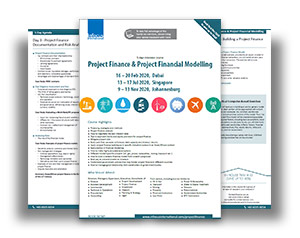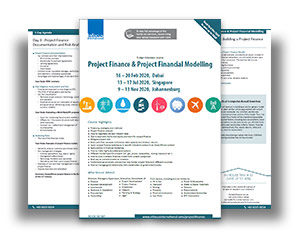Project Finance & Project Financial Modelling
Overview
Modern project finance transactions requires a high level of expertise in building financial models which are reliable and flexible to accommodate the changing requirements occurring during the life of a project. This 5 days course covers both project finance and financial modelling best practices.
The first 3 days of the programme provide project financing skills you can immediately use upon return to your workplace. You will learn demonstrated analytical strategies to assess the degree of risk and benefits of specific project financing, along with the elements of the day-to-day business and operational aspects. This programme is also designed to enhance the checklists and benchmark metrics by which you can reduce losses and which will be viewed favourably by both management and the regulatory community.
The last 2 days of the programme cover financial modelling techniques, including how to model the role of debt, debt covenants, cash waterfalls, inter-creditor relations, restructuring and rescheduling of debt, how to model risk, and the role of equity and its rewards. In the course of the 2 days, you will build and evaluate a range of project finance models, covering projects as diverse as conventional and renewable energy investments, mines and private hospitals. You will overcome the most complex aspects of building a reliable model, including uncertainty, currency and timescale mismatches, debt amortisation, depreciation, control account waterfall, cost structures, and the ability to easily shift time scales, as well as the ability to identify and control key sensitivities through spreadsheet simulation.
Course Highlights
- Financing strategies and methods
- Project finance analysis
- How to negotiate the best interest rates
- Tips to approach banks and equity providers for project finance
- Mitigate project risks
- Build cash flow cascades to forecast debt capacity and investor returns
- Apply project finance techniques in specific industrial sectors in an African context
- Best practice in financial modelling
- How to make highly accurate assumptions
- Different model types for projects (oil, gas, power, renewables, mining, transport etc.)
- How to build a reliable financial model from scratch using Excel
- Best way to present models to investors
- Understand government policies that may hinder project finance in different countries
- How to manage good relationship with stakeholders & government bodies
Practical Computer-Based Exercises
The trainer will lead you in building an entire, generic model from scratch. Each portion will be approached with a short presentation and examples. You will then use this new information to build another portion of the model. Thus, the outline of a cash flow model will be created and populated with the required factors, including basic assumptions, input data and calculations to calculate results; you will then build on the model to add sensitivities, inflation factors, financial structures, balance sheet, P&L, equity returns, ratios and cover factors, and risk assessments.
All participants should bring a laptop with Excel. USB flash drives containing example files will be provided.
Course Agenda
DAY 1: Project Finance in Theory and Practice
- What is Project Finance?
- Case Study: Constraints on project finance in contemporary Africa
- Case Study: Choosing project vs corporate finance
- Project Finance – the Parties
- Case Study: Differentiation between oil & gas, mining and power projects – examples and applications
- Making the Case for Project Finance
- Case Study: Forecasting power and aviation demand in Africa
- Group Discussion: the contribution of project finance to economic development in Africa
- Stages in the Deal
- Case Study: How to benchmark a major industry
- Group Exercise: Putting together a project finance deal
DAY 2: Funding and Structuring a Project Finance Deal
- Sources of Funding
- Case Study: Role of the African Development Bank and other multilateral institutions in infrastructure development
- Bank Lending
- Case Study: Formulation and examination of bank lending ratios
- Case Study: Infrastructure bond finance – the major alternative to the banks?
- Group Exercise: Presenting a project finance proposal to a bank
- Third Party Investment in Project Finance Deals
- Case Study: Infrastructure investment funds in Africa
- Group Exercise: Continuing the exercise above, you will present to an infrastructure fund for third party investment
DAY 3: Project Finance Documentation and Risk Analysis
- Project Finance Documentation
- Case Study: FIDIC contracts
- Due Diligence Assessment and Risk
- Case Study: Evaluating a World Bank/IFC proposal
- Analysing Risks
- Case Study: Examples of project finance models
- Summary: African project finance in the first quarter of the 21st Century
DAY 4: Financial Modelling Using Excel
- Using Excel for Modelling
- Project Cash Flow
- Project Finance Models
- Case Study: Valuation and Cash Flow models
- Case Study: Revenue and cost models
- Project Finance in Practice
- Case Study: Modelling cash flow waterfalls
- Approaches to Rating in Project Finance Models
- Using Project Finance Models
- Case Study: Review of several project finance models and their decision-making input
DAY 5: Building a Project Finance Model
- Practical Computer-Based Exercises, including:
- Project review
- Analysing the inputs
- Dealing with input priorities
- Data plausibility
- Cashflow projections
- Loan assessment
- IRR, NPV and other valuation analysis
Training Methodology
This course includes a mixture of lectures, videos, discussion, presentations by participants, exercises and case studies from a range of African and global project finance deals. You should bring laptops to take away the many materials provided in the course.
Throughout 5 days, you will learn all the available techniques and how to practically apply them through the use of Excel. Make sure you bring your laptop for 2 reasons. First, plenty of models will be provided on Day 4 and an extensive use of case studies will be adopted to illustrate the principles covered. Second, Day 5 is devoted to the step-by-step construction of a project finance model from provided templates, which you can take away at the end of the course. You will also run risk analysis on the model.

Pre-Course Questionnaire
We would like to customise the workshop based on your specific needs. Pre-Course Questionnaire will be sent prior to the workshop for analyse in advance and to be addressed during the course.

Course Certificate
Upon the successful completion of this course, you will receive a Certificate of Completion bearing the signatures from both the Course Director and the Course Organiser. This Certificate will testify your endeavour and serve towards your professional advancement.
Who Will Attend
Professionals of:
- Finance
- Business Development
- Commercial
- Technical & Operations
- Procurement
- Accounting
- Project Development
- Project Finance
- Investment
- Treasury
- Planning & Strategy
- Legal
From sectors:
- Oil & Gas
- Transport
- Mining
- Property
- Financial Institutions
- Law Firms
- Power & Renewable
- Water & Waste Treatment
- Telecom
- Petrochemical
- Government Authorities
- EPC Contractors
You Might Also Be Interested In
Public Private Partnership
In-depth understanding of how PPPs work, from financial, commercial, project & legal aspects
Date To Be Announced
Power Project Finance
Understanding the principles which create a bankable power project finance structure in terms of risk allocation and the commercial and financial structure
Date To Be Announced
Project Finance & Project Financial Modelling (Online Course)
Project finance and financial modelling best practices with practical case studies






























